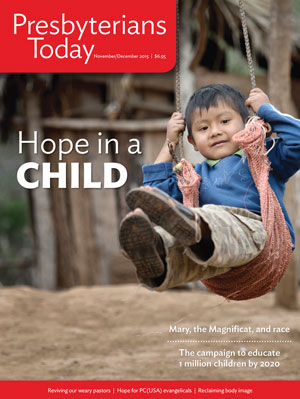 Hope in a child
Hope in a child
A call this Advent to educate and care for the vulnerable children of the world
by Alonzo Johnson
As a pastor, I’ve had the chance to work with a lot of young people, some of them really struggling to survive. For many of the youth I’ve worked with, it’s a creative arts and education ministry that has turned the tide.
Mark (not his real name, of course) was one of those kids.
He was born into poverty but was full of potential. Witnessing violence and deprivation no child should ever see, he wrestled with whether to stay in school or join a gang. Our arts ministry told him that his intellect and talent made him more powerful than any gang affiliation ever could, but the streets told him differently, and sometimes he succumbed to the world of illegal drugs. Whenever I saw him on the street corner, dressed in “colors” and standing with gang members, I pulled over and took him home, risking both our lives.
Eventually, Mark chose us over the dealers. As he became older, Mark, like so many, suffered a few of life’s bumps and setbacks, but always managed to stay connected to his family at the arts ministry. Eventually, he relocated, and just when it seemed I’d never hear from him again, I got a message saying that he had graduated from college with an engineering degree.
Mark did more than survive; he found hope. And it’s Mark that I think of during Advent.
Advent in many ways is about tranquility—quieting the noise of the world to refocus on the birth of Christ in our lives. And yet we know that there is much that makes the night of Christmas Eve not so silent. Jesus, our savior, the prince of peace, comes to us in the most precarious of situations. In the birth narratives of the Gospels, we find a child born with no access to the safety of an inn. Apparently, Jesus, God incarnate, chose to take his place among those, as theologian Howard Thurman states, “with their backs to the wall.”
Despite all of its tranquility then, Advent shows that we put our faith in a baby born in struggle and fragility. But there’s good news: the most famous vulnerable child in history becomes the master teacher. Jesus’ story, like Mark’s, beckons us to see the potential of the image of God in all of our young people. As Presbyterians, we heed the corresponding call to the work of education.
A new campaign
In 2014, the 221st General Assembly launched a Presbyterian Mission Agency campaign to educate 1 million children worldwide by 2020. In both the national and international facets of the initiative, titled “Educate a Child, Transform the World,” Presbyterian World Mission and Compassion, Peace, and Justice are working with partners here and abroad to:
1) Address poverty and strengthen communities’ capacity to provide quality education
2) Improve and increase early childhood programs offered by and in Presbyterian congregations
3) Improve training and resources for teachers
4) Train leaders as advocates for education
5) Create safe environments for young people
6) Give voice to national public-policy debates
7) Encourage congregation-based strategies
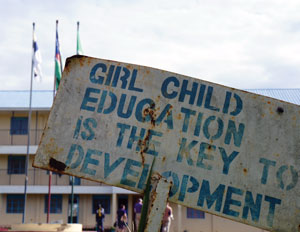 Part of the initiative is the firm conviction that congregations can make a difference in filling the void between poverty and access to education.
Part of the initiative is the firm conviction that congregations can make a difference in filling the void between poverty and access to education.
As Presbyterians, we regard education as an integral part of our heritage. When I ask Presbyterians, “What is one of the most important things we hold dear?” without fail the answer is enthusiastically “Education!”
As Advent is a time for decluttering and for removing stumbling blocks in our lives, Advent also reminds us that we are called to remove the stumbling blocks that prevent children—“the little ones” whom Jesus loves—from living lives of hope, self-determination, and dignity.
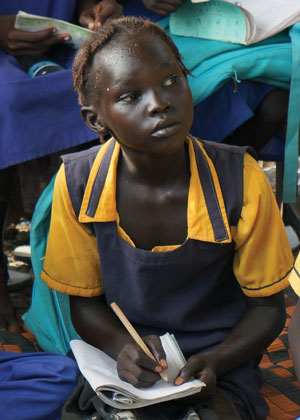
At a girl’s school in Sudan
This includes volunteering as a tutor or mentor, providing meals or school supplies, organizing an afterschool program attentive to cultural and linguistic diversity, and becoming passionate advocates for education by supporting legislation that could better conditions for our schools and our communities.
Naming the threats
As Jesus’ own life was threatened, so too are the lives of many of our children—for Advent is also the time of Herod the Great’s call for large-scale infanticide, found in Matthew’s Gospel (2:16–18).
In the slaughter of innocent children, Herod becomes symbolic of those powers or principalities in our world that threaten the well-being—and even existence—of children everywhere. Each time I read this disturbing story, I am led to ask, “What are the modern-day ‘Herods’ of our time?” And they are legion.
More than 16 million children live in poverty in the United States alone, with 1.6 million experiencing homelessness each year. According to UNICEF, 1 billion children worldwide are deprived of one or more services (such as healthcare and education) essential to their development and survival. The Herods of racism, sexism, classism, war, violence, and exploitation are all threatening our children.
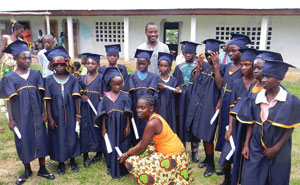
The last day of the school year at Dougbe River Presbyterian School, the first in the isolated region of Twarbo in post-war Liberia
Here in the United States, zero-tolerance policies push our children into the school-to-prison pipeline, where African American children experience a rate of suspension three times higher than their white counterparts. African American and Latino children are also twice as likely as whites not to graduate.
Seeing the signs
Some years ago, when I was a volunteer chaplain in a medium-security correctional facility, I noticed a young man frequently carrying incredibly large books, most of them commentaries. One day, this young man was reading a book that made Tolstoy’s War and Peace look like a dime-store novel. Out of curiosity I said to him, “Every time I see you, you are reading some of the largest books I have ever seen.” His reply has stuck with me. “Well, chaplain, the fact that I was not able to read was part of what got me here in the first place. I have decided not to ever let that happen again.” I was glad he was getting education there in the prison but wished it had happened sooner.
The Advent season challenges us to recognize what God is doing in the lives of our children, just as the Magi were able to read in the constellations signs of the Messiah’s arrival. In reading the stars, we recognize that our young people, like the constellations, are manifold and precious. The “Educate a Child” initiative (pcusa.org/child) invites us to see the signs and learn what God is doing in our denomination, as well as to discern what Christ’s call may be in our own context.
Alonzo Johnson is an associate for mission with the Presbyterian Peacemaking Program and the convener of the Educate a Child domestic initiative.
Education changes a boy’s world
A Presbyterian scholarship and other assistance help a Lesotho child secure a new future.
by Kathy Melvin
Nelson Mandela famously said, “Education is the most powerful weapon which you can use to change the world.” John Matlosa, and all those who know him, would be among the first to agree.
Born into a poor family in the mountains of Lesotho, a country encircled by South Africa, Matlosa and his siblings were raised by a single mother. In order to feed and clothe the children, their mother contracted with a man in the village for Matlosa and his brother to herd cattle. In this largely rural and agrarian country, it is not an unusual occupation for boys, ages 7–12. The opportunity to attend school full-time was a distant dream.
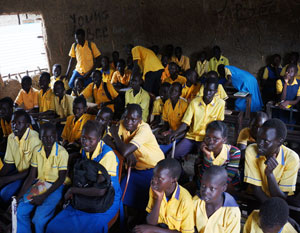
A girl’s school in Sudan
John’s life changed when his mother moved her family to the capital city to give her children an opportunity to go to school. Matlosa was 10 years old when he started his formal education. A friend brought him and his sister to a local church where he became active in the youth program, studied the Bible, and learned English, progressing quickly in his studies. Through a Presbyterian Church (U.S.A.) partner church, John’s mother received a loan that allowed her to begin raising chickens and marketing the eggs. The church also provided a scholarship so Matlosa could continue his studies full-time.
In Lesotho, Presbyterian partner churches manage a large number of schools and have been involved in education for more than 180 years. In recent years, the churches have added nonformal and distance-learning programs for children, like Matlosa, who cannot attend regular classes.
Matlosa went on to attend high school in Lesotho, and after graduation attended the Centre for Accounting Studies, where he excelled in internal auditing. He was the first Mosotho (an indigenous person to Lesotho) to become a certified internal auditor. Now in his early 30s, Matlosa has helped found and is the current governor of Lesotho’s Institute of Internal Auditors. He married his wife, Rethabile, at the church where he began attending Sunday school years ago and where he remains a congregational leader, dedicating his time and talent.
The church also helped him bury his beloved mother.
“John’s story is similar to millions of children whose education is delayed or interrupted due to work demands, migration, illness, and family circumstances. When the opportunity exists for children to receive a quality education, it can be transformative—it was for John,” says Frank Dimmock, who, with his wife, Nancy, was a mission coworker in Lesotho and knows Matlosa well, often communicating through email. Today, Frank leads Presbyterian World Mission’s international facet of the campaign to educate 1 million children by 2020, “Educate a Child, Transform the World.”
The campaign was created after listening to PC(USA) congregations and global partners about the need to go deeper and address the root causes of poverty, as one of three critical global issues. Education promotes human development and basic literacy that empowers the poor to emerge from poverty. Globally, as many as 774 million adults are illiterate.
Internationally, one of the key components of fighting poverty is creating a safe environment for children, especially girls, to have access to quality education. Millions of girls around the world never enroll in school, and many who do, drop out without acquiring adequate skills to reach their potential. For instance, in South Sudan, UNICEF reports that a girl is three times more likely to die in childbirth than to complete eighth grade.
The PC(USA) has a 178-year history of providing educational access for children in the United States and around the world. Individuals and congregations interested in building on this rich legacy and offering children a future of hope can join the campaign by visiting pcusa.org/global-poverty for the international component.
Nelson Mandela also said, “It always seems impossible until it’s done.”
Kathy Melvin is director of Mission Communications for the Presbyterian Mission Agency.
Message of hope in Madagascar
Unique education model leads to success for mission coworker.
by Kelly Boyer Sagert
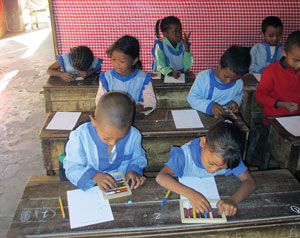
First grade students in Madagascar use a rudimentary abacus to do calculations at one of the schools assisted by mission coworker Jan Heckler.
In 1971, psychology graduate student Jan Heckler was working in a learning lab at the University of Florida, helping academically struggling athletes, when she and her colleagues began to observe that the lab was having a 100 percent success rate at keeping the athletes’ grades high enough to stay in school and participate in sports.
Because of the personalized learning lab’s success with athletes, they decided to open it up to another group facing challenges: students of color who had been educated as children during an era when racial integration was new.
“Segregation may have been officially over,” says Heckler, now a mission coworker through Presbyterian World Mission. “But these students clearly hadn’t had enough educational opportunities and so were ill-prepared for college. The university was trying to balance its student ratio racially, but—even though these students were intelligent—the effort was virtually a total failure, with 90 percent of these students of color flunking out by the end of their freshman year.”
When these students were given access to the school’s learning lab, though, the results were completely inverted. “Ninety percent of them now stayed in school; they earned good grades, and many of them got their degrees,” Heckler recalls.
The secret to this success, at least in part, was a process known as evidence-based methods of instruction. EBMI emphasizes continual assessment, positive reinforcement, and the mastering of skills through repeatable opportunities, modeling, and guided practice. Even though Heckler’s learning lab only used about one-third of EBMI’s procedures, the lab still achieved remarkable success. Starting in 2003, Heckler began sharing this teaching method in multiple African countries.
Transforming lives
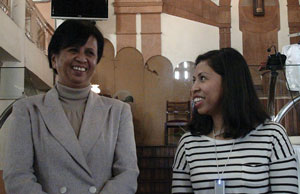
Prisca Ratsimba and Sarah Ravel gathered, alongside PC(USA) staff, with other members of the Reformed church in Madagascar and staff of the Betela Ambodimita primary school for a briefing on evidence-based methods of instruction.
The United Nations Educational, Scientific and Cultural Organization (UNESCO) makes a strong case that education triggers transformation. According to their Education Transforms Lives report in 2013, workers in the United Republic of Tanzania who have a primary school education are 20 percent less likely to be poor, while earning a secondary education reduces the risk by nearly 60 percent. When educational reforms in Kenya added 1.8 years of education for women, they saw a 34 percent decline in maternal mortality rates. And in Arab states, a one-year increase in education is associated with a 23 percent decrease in the number of children (under age five) dying from pneumonia.
Knowing the importance of education to dismantling poverty, Heckler began sharing EBMI in Malawi, Namibia, and Ethiopia. Results initially varied. “It isn’t unusual for new educational teaching methods to help one third of the students, hurt another third, and produce so-so results for the others,” Heckler says.
Ultimately, though, EBMI, proved a success. “In Malawi, there were 48 learners in a class and all but two of them improved significantly in their schoolwork,” Heckler says.
Called to unite her passion for education and her faith calling, Heckler became in 2012 a Presbyterian Church (U.S.A.) mission coworker in Madagascar, the fourth largest island in the world, located off the southeast coast of Africa. Impoverished and devastated by drought, this country ranked 155th among 187 countries in the 2014 Human Development Report; 72 percent of its 22 million people live below the poverty line. “A huge proportion survive on $2 a day or less, and children go through dump sites in obvious disarray,” says Heckler.
Trying to change the way curriculums are handled in Madagascar has been no easy task. The existing curriculum often isn’t written down and, if it is, it might be handwritten—in French. And even if the curriculum can be located and translated, that doesn’t mean it’s actually in use; educators in Madagascar have often taken pride in going outside established curriculum.
Other challenges have included travel. “It can take days to travel only a few hundred miles, and road conditions vary, especially in rainy seasons, so collaborating takes plenty of planning,” Heckler says.
Difference maker
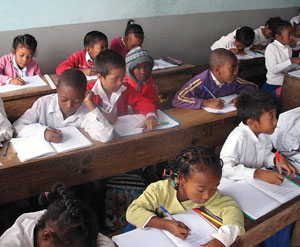
Third grade students at Betela Ambodimita in Antananarivo, Madagascar, receive education founded in evidence-based methods of instruction.
Although EBMI is in its early days in Madagascar, improvements are showing.
“Children [here] have had few opportunities to bring God’s gifts to fruition, as their lives have been minimized, restricted, and confined,” Heckler says.
“Let’s face it, if you knew your future involved sitting on a hot street corner selling tomatoes, how engaged in life would you be? It isn’t unusual for a child to fall behind, become embarrassed, and drop out because there is no safety net.”
Mirantsoa, a nine-year-old student at Betela Ambodimita primary school, was failing. She didn’t want to return to school. Then Sarah Ravel, a teacher trainer in EBMI, began working with Mirantsoa’s teacher, Zina Raharmimalala. Now Mirantsoa performs at exceptional levels and rarely gets quiz questions wrong.
“We’re looking to train counterparts in Madagascar, including a 6-million-member Reformed church with 720 of its own schools,” Heckler says, referring in part to a new campaign of the PC(USA) called “Educate a Child, Transform the World.”
“If we can change this system, the whole country will take note,” she says. “We are also beginning to get the teacher college involved.”
“This isn’t just educational reform,” Heckler says. “This is a revolution in education! The PC(USA) has a chance to do something so incredible that it’s hard to sleep at night.”
Kelly Boyer Sagert is a Presbyterian ruling elder and a professional freelance writer and content marketer.
Church partnership leads to literacy
Presbyterian congregation invests in effort to educate a child.
by Rick Jones
Yvonne and José moved with their parents to Shelbyville, Kentucky, from Central America when they were both second graders. Their parents were looking for work in the agricultural and horse industry but wanted to ensure that their children received a quality education, recognizing that the language barrier could present some challenges.
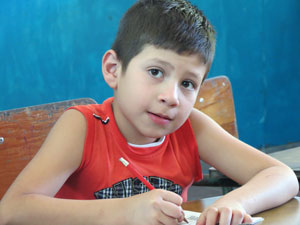
A child works at his desk in a school in El Salvador supported by Presbyterians. The international component of Educate a Child hopes to improve his education there, but if he comes to the United States the domestic initiative will seek to support him through our congregations.
According to the family, the public schools welcomed the children with open arms, recognizing their parents’ desire to see them succeed. The teachers immediately saw the need for one-on-one help with literacy and reading comprehension.
That’s when a member of First Presbyterian Church of Shelbyville approached her pastor to see what its congregation could do to help. With seed money from the Presbyterian Church (U.S.A.), First Presbyterian partnered with three other congregations in the area to create Arriba Niños, a literacy and tutoring program. Centenary United Methodist Church, Catholic Church of the Annunciation, and First Christian Church formed a covenant with First Presbyterian to work together to meet the growing needs of children like Yvonne and José.
“People just said, yes, they would help,” says Diann Cook, executive director for Arriba Niños. “Members of all four congregations live their faith by their witness to the children. We love and care for one another. Together we make a difference for these children and in our community.”
Only 18 percent of schools meet basic reading standards, according to church officials overseeing the Presbyterian Mission Agency’s Educate a Child initiative. The US Department of Education has reported significant shortages of teachers in bilingual education as well as math, science, and special education.
The national component of the campaign focuses on two main objectives: strengthening early childhood education and reducing the high-school dropout rate. Presbyterian congregations across the country are being encouraged to get involved in their own communities through similar tutoring and afterschool programs while connecting with school boards.
Cook credits the public school system in Shelbyville as a key partner in the process. Teachers identify and invite students who might benefit from the program and introduce it to their parents.
“I want the children to be successful,” says Faun Fishback, a member of First Christian Church and one of the first program volunteers. “Providing one-on-one assistance makes a difference, and it’s rewarding. These are smart children with a language barrier, and we can help remove that barrier. Their success is our community’s success.”
Program leaders say the initiative has come full circle. A new generation of children is now being tutored by some of its original participants.
“We see the students finish school, get jobs, and go on to college,” says Cook. “They are successful and in turn, give back. The program is very rewarding.”
As for Yvonne and José, they’ve never forgotten what they received from the program in Shelbyville. Church leaders say Yvonne is now in college on a full scholarship and tutors in the program. José is in high school and tutors second graders.
Rick Jones is a communications strategist for the Presbyterian Mission Agency.


